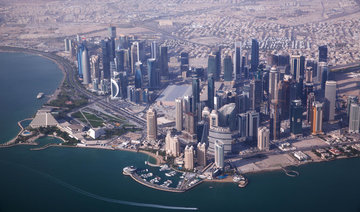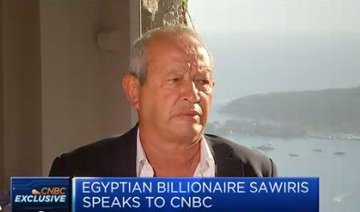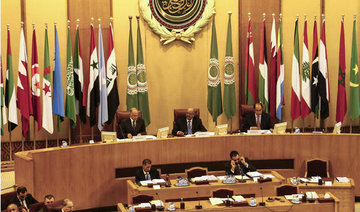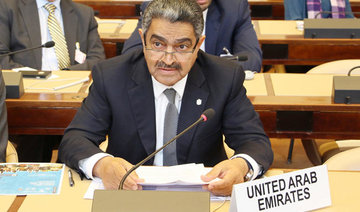LONDON: Qatari exiles gathered at a conference in the UK on Thursday called for international assistance to end their “suffering,” a day after it emerged that Doha had stripped 55 nationals of citizenship.
The opposition event was held in London amid high security, with some speaking about their plight publicly for the first time.
In a panel discussion chaired by the veteran BBC journalist John Simpson, one Qatari exile described how he had been stripped of his citizenship.
Mohammed Al-Murri made a plea for Saudi Arabia and the UK to help. He asked the UK, with its history of democracy, to address the human rights issues in Qatar in order to “put an end to our suffering,” he told the conference.
“All of us were deprived of our passports … It is impossible for us to accept this,” he said.
It emerged earlier this week that Qatar has stripped 55 members of the Al-Murrah tribe of their citizenship, including its head Sheikh Taleb, in a move slammed as “collective punishment” by human rights groups. It follows a previous move by Doha to force 6,000 tribal members to flee the country, according to reports.
Al-Murri claimed to be related to Sheikh Taleb, although this could not immediately be independently verified. “Unfortunately the Qataris took away the nationality from the … tribe,” he told the conference in London. “Even though we are Qataris through and through, we are suffering.”
Al-Murri said his father had been imprisoned in Qatar, while he had not been able to see his mother before she died. “My father was tortured,” he said. “My mother suffered from cancer until she died, but we could not visit her … We have been suffering for decades now and we would like to see a solution.”
Al-Murri was addressing the “Qatar, Global Security & Stability Conference,” which was held amid the diplomatic row between Qatar and the Anti-Terror Quartet — Saudi Arabia, the UAE, Bahrain and Egypt.
Opposition member Khalid Al-Hail, spokesman for the Qatar National Democratic Party and organizer of the conference, reiterated claims that Qatar supports terror groups. Doha denies the charges. “I represent the voice that is not being listened to by the world … The voice of the Qatari people,” he said.
Al-Hail said that Qatar supports terror groups like Al-Nusra Front — which is now known as Jabhat Fateh Al-Sham — along with Al-Qaeda and the Muslim Brotherhood.
“Qatar is harboring fugitives and extremists,” he claimed. Al-Hail also pointed to Qatar’s alleged ties with Tehran, something he believes is at odds with the interests of the Gulf Cooperation Council (GCC). “We had problems because Iranians always had their eye on Qatar… You cannot be a friend of Iran and claim to be a friend of the GCC,” he said.
“Most of the illicit trade that finds its way into Qatari markets come through Iran.”
The conference also heard from Thomas Mace Archer-Mills, a constitutional expert, who said Doha’s claims that the country is a constitutional monarchy amounts to “whitewashing.”
Qatar’s funding of the Al Jazeera media network was also raised at the London conference, with former employee Mohammed Fahmy taking aim at the channel’s editorial line.
Fahmy worked in Cairo for Al Jazeera English, but was arrested and spent time in prison on charges that after allegations, he and colleagues filed reports that were damaging to Egypt’s national security.
After his release Fahmy initiated legal proceedings against Al Jazeera; he told the London conference that the network did not reflect the concerns of Qatari citizens.
“They say ‘we are the voice of the voiceless.’ Where is the voice of the Qataris? Where is the voice of the Qatari opposition?,” he said. “That is the problem with Al Jazeera.”
The conference in London was held amid tight security, with police, sniffer dogs and private security guards patrolling the site.
Organizer Al-Hail said attempts had been made to prevent the event from going ahead, and that he has fears about his personal safety due to his opposition activities.
“I fear for my life. I have a very big genuine fear of persecution from Qatar. I know what these guys are doing, and they have lots of bad history,” he told Arab News in an interview earlier this week.
Qatari exiles in UK make plea for end to ‘suffering’
Qatari exiles in UK make plea for end to ‘suffering’

Syria’s new intel chief vows reforms to end abuses

- Most of these installations are now guarded by fighters of Hayat Tahrir Al-Sham (HTS), the Islamist group that led the armed coalition that seized power in Damascus
DAMASCUS: The new head of Syria’s intelligence services announced on Saturday a plan to dissolve the institutions that were so feared under the rule of ousted dictator Bashar Assad.
“The security establishment will be reformed after dissolving all services and restructuring them in a way that honors our people,” Anas Khattab said, two days after being appointed to his post by the country’s new leadership that overthrew Assad in early December.
In a statement carried by the official Sana news agency, he stressed the suffering of Syrians “under the oppression and tyranny of the old regime, through its various security apparatuses that sowed corruption and inflicted torture on the people.”
Prisons were emptied after Assad’s fall as officials and agents of the deposed regime fled.
Most of these installations are now guarded by fighters of Hayat Tahrir Al-Sham (HTS), the Islamist group that led the armed coalition that seized power in Damascus.
Numerous Syrians have rushed to former detention centers in the hope of finding traces of relatives and friends who went missing during the 13 years of a devastating civil war that left more than a half million dead.
“The security services of the old regime were many and varied, with different names and affiliations, but all had in common that they had been imposed on the oppressed people for more than five decades,” Khattab continued.
According to the Syrian Observatory for Human Rights (SOHR), more than 100,000 people died in Syrian prisons and detention centers during the conflict.
On Thursday, a general who ran military justice under the former regime was arrested in the west of country, accused of being responsible for sentencing to death thousands of people held in the notorious Saydnaya prison.
And in Europe, several former senior Syrian intelligence officers accused of torture and other abuses have been convicted and jailed since 2022.
Turkiye court jails three for life over death of 8-year-old girl

- Narin disappeared on August 21, sparking a huge search effort in Turkiye, with a number of well-known figures joining a “Find Narin” social media campaign
DIYARBAKIR, Turkiye: A Turkish court on Saturday sentenced three suspects including family members to life in prison over the mysterious death of an eight-year-old girl in the southeastern province of Diyarbakir, an AFP journalist saw.
The body of Narin Guran, who had been missing for 19 days, was found in September in a bag in a river around one kilometer (0.6 miles) from the village where she lived with her family.
After a tense day-long hearing, the court in Diyarbakir handed Narin’s mother, elder brother and uncle an aggravated life sentence on charges of “deliberate murder in collaboration,” according to the journalist at the courthouse.
The judge sentenced another suspect Nevzat Bahtiyar, who had confessed to the murder, to four years and six months in prison.
Police heightened security measures inside and outside the tribunal as the judge read out the verdict.
The court said that Bahtiyar found the body at Narin’s home, adding that he carried and hid it.
Abdulkadir Gulec, head of the bar association in Diyarbakir, told reporters the court verdict was near what they had expected.
“Bahtiyar should have received the same penalty,” he said.
Lawyers Nait Eren said they would object to the court’s ruling on Bahtiyar.
No motive was given for Narin’s murder.
Narin disappeared on August 21, sparking a huge search effort in Turkiye, with a number of well-known figures joining a “Find Narin” social media campaign.
Soon after the body was found, President Recep Tayyip Erdogan expressed profound sadness and said he would “personally follow the judicial process” so that those who took Narin’s life received the harshest punishment.
Prosecutors said in the indictment that the murder was likely committed by those close to Narin. They also accused Narin’s uncle — who is the highest local administrator in the village — of misleading authorities during the initial manhunt.
Speaking to the court during the hearing, Narin’s mother Yuksel denied the charges, lamenting that she would never see her daughter get married.
“They didn’t let my daughter wear a wedding dress, they put her in a shroud,” she told the judge.
“I didn’t even see her shroud or her grave,” she said. “My daughter was brutally killed.”
Yuksel also denied claims that she killed her other daughter, saying that she was physically handicapped and died in hospital.
2024 Year in Review: When turmoil and divisions deepened in Libya

- Fractured governance blamed for cycles of conflict and foreign meddling among other problems in 2024
- Local elections failed to provide a pathway to political reconciliation, stability and sovereignty
LONDON: When the Arab uprisings swept through the Middle East and North Africa in 2011, many in the West hoped the fall of these entrenched regimes would herald a new era of development and good governance. Instead, it marked the beginning of a period of unprecedented suffering for millions.
Nearly 14 years later, in the wake of a grinding civil war, there are now renewed hopes that Syria, after its brutally suppressed uprising, might finally be stepping into the light following the toppling of the Bashar Assad regime.
However, as a diverse array of victorious armed opposition groups struggle to impose order and unity on a fractured nation, many observers share a common fear — that Syria could become another Libya.

Indeed, since the NATO-backed uprising that ousted Muammar Qaddafi, Libya has become a byword for state failure — divided between rival administrations, plagued by criminality, and used as a proxy battleground by foreign powers keen to exploit its oil and strategic location.
While 2024 offered glimpses of possible reconciliation between the North African nation’s competing factions, steps toward national elections, and perhaps even justice for its long-suffering citizens, the country remains deeply unstable as it enters the new year.
In April, Abdoulaye Bathily, the UN special envoy to Libya, resigned, citing the country’s entrenched political stalemate. His resignation followed 18 months of attempts to mediate between Libya’s divided factions, but a “lack of political will and good faith” thwarted progress.
“The selfish resolve of current leaders to maintain the status quo must stop,” Bathily told the Security Council. The delay of the national reconciliation conference, originally scheduled for April, highlighted the ongoing gridlock.
While Libya’s oil-rich economy offers immense potential, it remains plagued by a fractured political landscape — with the Tripoli-based UN-recognized Government of National Unity headed by Abdul Hamid Dbeibeh opposing the eastern administration allied with General Khalifa Haftar, commander of the Tobruk-based Libyan National Army.

Bathily’s departure underscored the international community’s struggle to bring stability to a nation divided since the 2011 uprising. Despite his efforts, Libya’s entrenched rivalries and external meddling have kept progress elusive, prolonging the suffering of its population.
Libya’s fragile peace was repeatedly shattered in 2024, with violence escalating across major cities and border regions. In May, clashes in Zawiya between militias loyal to the GNU left one dead and six injured.
Violence escalated in Tripoli in July, where clashes between the Interior Ministry’s Special Deterrence Forces, also known as RADA, and Presidential Council units resulted in 13 fatalities, including civilians. August brought another tragedy in Tripoli, with nine killed in militia fighting.
Although political leaders have periodically called for ceasefires, the lack of cohesive state authority has allowed armed factions to exploit and perpetuate the chaos, leaving Libyans trapped in repeated cycles of violence.
Amid this summer of bloodshed, there was a glimmer of justice. In July, Libya’s Derna Criminal Court sentenced 12 officials to up to 27 years in prison for their roles in the catastrophic Sept. 10, 2023, dam collapse.
The disaster, triggered by Storm Daniel, unleashed torrents of water that obliterated entire neighborhoods in the coastal city of Derna, claiming thousands of lives.

Neglected infrastructure and corruption were deemed key factors in the disaster, as funds earmarked for dam maintenance were found to have been misappropriated. The court’s verdict represented a rare moment of accountability in a nation fraught with impunity.
While some saw this as a step toward justice, critics argue systemic reform is still absent.
Rebuilding efforts in Derna remain slow, hindered by political infighting. Meanwhile, the disaster’s survivors, grappling with trauma and displacement, want to see comprehensive infrastructure upgrades to prevent future tragedies.
September brought a breakthrough as Libya’s rival legislative bodies agreed to appoint Naji Mohamed Issa Belqasem as interim central bank governor, ending months of turmoil over financial leadership.
This crisis erupted when Tripoli’s Presidential Council moved to replace longstanding Governor Sadiq Al-Kabir, leading eastern factions to halt oil production in protest.

Libya’s oil-dependent economy suffered immensely, with crude exports plummeting from 1 million barrels per day in August to just 400,000 in September.
The UN facilitated the agreement, urging an end to unilateral decisions that deepen institutional divisions. While the resolution temporarily eased tensions, it highlighted the broader issue of competing power centers undermining Libya’s economic stability.
With the interim governor tasked to form a board of directors, the deal’s success hinges on sustained cooperation, a rare commodity in Libya’s fragmented political landscape.
The murder of Abdel-Rahman Milad, a notorious Libyan Coast Guard commander known as “Bija,” in September spotlighted Libya’s lawlessness and corruption.
Sanctioned by the UN in 2018 for human trafficking, Milad symbolized the overlap of state and criminal enterprise.

Speculation still abounds about the reason behind his killing — ranging from militia infighting to fears he might expose high-level corruption.
Milad’s killing also raised questions about the EU’s reliance on Libyan partners accused of human rights abuses to help control the flow of migration to Europe.
Observers see his death as a byproduct of power struggles between rival gangs and a reflection of Libya’s inability to reform its fractured governance and security apparatus.
While Milad’s death may serve as a test for Libya’s broken justice system, there has been some progress on addressing historic injustices.
October saw the International Criminal Court unseal arrest warrants for six Libyans implicated in war crimes during the Second Libyan Civil War of 2014-20. The suspects, linked to the Kaniyat militia, face charges including murder, torture and sexual violence.
These crimes occurred in Tarhuna, a town notorious for mass graves uncovered in 2020 after the militia’s retreat.

The ICC warrants mark a significant step toward accountability and highlight ongoing international scrutiny of Libya’s human rights record. However, Libya’s weak judicial system and fragmented governance pose challenges to enforcing these warrants.
As families of victims seek closure, the outcome may set a precedent for addressing atrocities committed during Libya’s protracted conflict.
In November, the GNU’s Interior Minister Emad Al-Trabelsi sparked widespread condemnation from human rights groups when he announced plans to establish a morality police force.
The new force would enforce conservative social norms, including mandatory veiling for girls over the age of nine and restrictions on women’s mobility without a male guardian.
Al-Trabelsi justified the move as preserving “Islamic social values,” dismissing personal freedom as incompatible with Libyan society.

However, the measures appear to have been slapped down by the GNU. There are also doubts that the government even has the means to enforce such rules.
“Al-Trabelsi’s sweeping moral measures were never likely to materialize,” Jalel Harchaoui, a Libya expert and senior fellow at the Royal United Services Institute, told Arab News. “Enforcing such rules requires broad territorial control, religious credibility, and a clear moral gap to address.
“Much of Libya’s population is already conservative, the Interior Ministry lacks religious backing, and no armed actor — Al-Trabelsi included — can truly project power citywide, let alone nationwide.
“Unsurprisingly, nothing substantial has followed the initial announcement, which had drawn so much international attention.”
While national elections intended to reunify the country have been repeatedly postponed, November’s municipal polls marked a rare democratic exercise, with voting held simultaneously in Libya’s east and west for the first time since 2014.
Despite logistical challenges and political tensions, voter turnout hit 77 percent, signaling public demand for stability. The elections even included areas previously under military control, where mayors had been replaced with appointees.

International observers, including the G7, praised the process as a step toward national reconciliation. However, skepticism remains about whether these local elections can pave the way for overdue presidential and parliamentary votes.
Libya has become one of the busiest and most deadly routes used by migrants and refugees attempting to reach Europe — something that armed groups have long facilitated for a profit or have sought to curtail, often brutally, in exchange for EU funding.
Tragedy struck Libya’s migrant routes repeatedly in 2024, with multiple fatal incidents highlighting the perils faced by those seeking refuge.
In September, a boat capsized near Tobruk, leaving 22 missing. October brought another disaster, with only one survivor from a vessel carrying 13 passengers. Then in November, 28 people disappeared off Libya’s coast when their rubber boat got into difficulty.
Rights groups criticized both Libyan and European policies that push migrants into perilous crossings. The Mediterranean remains a graveyard for those fleeing violence and poverty, with international efforts to address the crisis falling short.
The Kremlin’s strategic ambitions in Libya are likely to keep growing in the new year as it seeks to offset losses in Syria following the overthrow earlier this month of Assad, a key ally who had permitted Russian use of air and naval bases.

Moscow has deepened ties with General Haftar’s Libyan National Army in recent years, using Libya as a launchpad for expanding its influence in North Africa and the Sahel.
The Wagner Group, a Russian private military contractor recently rebranded as the Africa Corps, has established bases in southern Libya, supporting resource extraction and military operations across the continent.
Russia’s efforts to consolidate its presence in Libya align with broader objectives to counter NATO and secure Mediterranean access for its ships.
As Libya’s rival factions vie for power, analysts believe this kind of foreign influence could further complicate efforts to achieve peace and sovereignty.
While Syria embarks on its own delicate transition out of war and dictatorship, Libya stands as a cautionary tale for what can happen when factionalism, greed, and foreign interests are allowed to trump the needs and aspirations of a long-suffering people.

Netanyahu to undergo prostate removal surgery

- Israeli leader diagnosed with urinary tract infection resulting from benign prostate enlargement
JERUSALEM: Israeli Prime Minister Benjamin Netanyahu is to undergo prostate removal surgery on Sunday, his office said after he was diagnosed with a urinary tract infection.
The procedure comes with Israel at war against Hamas militants in the Gaza Strip more than 14 months after the Palestinian militants carried out an unprecedented attack on Israel on October 7 last year.
Netanyahu underwent a test at Hadassah Hospital on Wednesday, where he was “diagnosed with a urinary tract infection resulting from a benign prostate enlargement,” the prime minister’s office said in a statement.
“As a result, the prime minister will undergo prostate removal surgery tomorrow,” it said.
In March, he underwent a hernia surgery, while in July last year doctors implanted a pacemaker in Netanyahu after a medical scare.
Gaza amputees get new limbs, but can’t shake off war trauma

- Survivors are haunted by memories of war and their terror of losing loved ones
ABU DHABI: Layan Al Nasr, 14, thought she would never walk again after both of her legs were amputated following an Israeli bombing in Gaza one year ago.
Now, she stands proudly on artificial limbs fitted in the UAE. But fear for her family, still living under the attacks, gnaws away.
“When I was told about prosthetics when I arrived, I didn’t even know they existed,” she jokes, taking a few steps supported by crutches.
She is able to smile as she describes her operations, rehabilitation and her newfound hope. But emotion eventually catches up with her.
“What scares me today is losing my brothers, my sisters and my father,” she confides, bursting into tears.
Nasr is one of more than 2,000 wounded or seriously ill Palestinians flown with their closest relatives to the UAE during the Israel-Hamas war.
Plucked from shattered Gaza, much of it in ruins, they are lucky to escape a conflict that has left more than 45,000 people dead in the Palestinian territory.
The survivors brought to the UAE are haunted by their memories of war and their terror of losing loved ones, despite their new existence in calm, quiet Abu Dhabi.
“I don’t care what happens to me, the important thing is that nothing happens to them,” insists Nasr.
The complex housing them in the UAE capital has a school, mosque, grocery store and a hairdresser, as well as a care center offering physiotherapy, speech therapy and counseling.
“Thanks to the prosthetics and the care provided, patients have regained their autonomy,” says physiotherapist Mustafa Ahmed Naji Awad.
But the hardest thing to treat is the psychological impact, he admits.
Faten Abu Khoussa, who came with her 10-year-old daughter Qamar, can testify to this.
The little girl was caught in an air raid in Gaza when she went out to buy a packet of crisps, losing a leg from her injuries.
Qamar’s spirits have gradually improved over time, but “it remains very difficult for her. She loved nothing more than playing on her scooter,” says her mother.
“She feels alone without her brothers and sisters” who have fled to Egypt, Abu Khoussa adds.
The single mother, now separated from the other children she has been raising since her husband’s death, is desperately trying to reunite her family in the UAE.
Until then she feels her life is “suspended,” leaving her unable to plan for the future.
The Emirati authorities say the afflicted Palestinians and their family members will be asked to return home when conditions allow.
Ahmad Mazen, 15, who came with his mother to have a lower-leg prosthesis fitted, was looking forward to being reunited with his father and brother.
But shortly after his arrival, he learned that they had been killed in a bombing raid.
His only consolation is football, his passion, and the “indescribable feeling” of finally being able to kick a ball again, he says.























